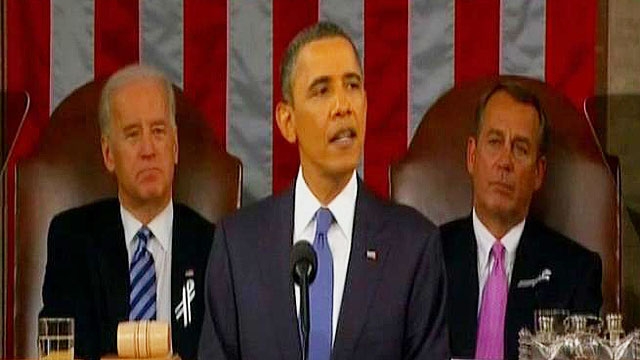When President Obama made a joke in his State of the Union speech about the layers of bureaucracy involved in protecting endangered salmon, it struck a nerve in the Pacific Northwest where salmon is definitely king.
Obama was making the point that government needs to run more efficiently than it does now. "The Interior Department is in charge of salmon while they're in freshwater, but the Commerce Department handles them when they're in saltwater," Obama said. "I hear it gets even more complicated once they're smoked."
The line drew laughs from both sides of the political aisle and according to one poll was the most memorable line in the speech. But as it turns out, the bureaucratic entanglement over salmon jurisdiction is even worse than Obama suggested. In addition to Commerce and Interior, the country's most pampered species is also protected by the departments of Energy, Agriculture and even Homeland Security. The Army Corps of Engineers has primary oversight of the fish as they pass through the many dams in the United States on their way to the oceans.
The Environmental Protection Agency and other agencies look after the fish. And through federal court rulings based on 150-year-old treaties, Native Americans play a large role in salmon management, as well as state and local governments.
The salmon bureaucracy, on the night of Obama's speech, became a symbol of what's wrong as the administration aims to streamline government. In the states of Washington and Oregon, though, the reaction has been mixed. Environmentalists who have made careers out of suing logging companies and pushing policies to help salmon were happy to hear the president address their life's work. However, they were not too thrilled with the implication that salmon are receiving too much attention from the government.
Joseph
Bogaard, of Save Our Wild Salmon,
admits there is overlap and wasted
funding. Efforts to save salmon runs
have cost the country $10 billion
over the last 20 years. And yet,
salmon runs still fluctuate wildly
from year to y ear.
ear.
"We are making decisions that are ineffective," Bogaard said "We're spending billions of dollars on programs that aren't working, we're not restoring our salmon, and as a result we don't have healthy, fishable populations."
But the problem with so many bureaucrats involved is a lack of accountability, some say. That's why some environmentalists are reviving their call for a salmon czar. "It could be helpful to have an overall salmon coordinator that would be appointed and working out of the Council of Environment Quality and reporting directly to the president," said the Sierra Club's Bill Arthur.
For many salmon advocates the lack of success in fully restoring salmon runs to pre-1900 levels can be blamed on politics. They say too often the best available science is ignored by politicians and bureaucrats who are trying to protect their jobs more than salmon. For example, many have been calling for years for the four dams on the lower Snake River to be breached allowing salmon to easily reach cold water spawning grounds in Idaho.
The National Marine Fisheries Services maintains that breaching those dams is not necessary, would cost billions of dollars and drive up the cost of electricity in the entire Pacific Northwest.
While the president's line about streamlining government and making it work more efficiently was appealing to fiscal conservatives, most are skeptical any real changes will be made. Scott St. Clair, of the Evergreen Freedom Foundation, said: "There will always be bureaucracy, it is always opposing any attempt to streamline it or organize it, because in doing so it puts them out of jobs."
Obama is making a statement on the subject in his most recent budget proposal. He is cutting funding to the Commerce Department for salmon efforts by $26 million this year. That comes out to more than 10 percent of its salmon budget.
But don't cry for the endangered salmon just yet. Obama's long-range plan is still to spend nearly $10 billion on salmon protection over the next decade.

